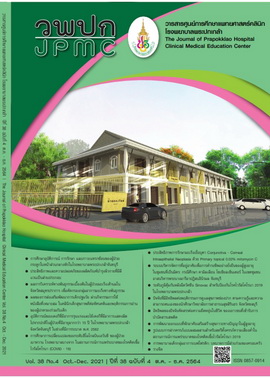Immune Level after Sinovac Vaccine Immunization for Novel Coronavirus in Prapokklao Hospital
Main Article Content
Abstract
BACKGROUND: The Coronavirus disease (COVID - 19) outbreak is rapidly and severely affecting public health systems around the world. Healthcare workers are the front line of contact with people who are at risk of infection. As a consequence, vaccination for health workers has taken place in all countries. Furthermore, the surveillance of antibodies after immunization is necessary because of the new pandemic. The vaccine used is also a new form approved for emergency use.
OBJECTIVE: To evaluate the level of antibodies after receiving the Sinovac Vaccine.
METHODS: A cross - sectional study was conducted in Prapokklao Hospital, Chanthaburi Province, Thailand on healthcare personnel who had received the second dose of the Sinovac vaccination. Blood was collected for more than four weeks to check the antibody levels. The estimation of the sample was computed using a two - tailed level that had a significance level of 0.05 (alpha = 0.05), 90% power given by the 50% theory, and expected 60 - 70% increase in the calculated immune level. The sample size was calculated to be 62 - 250 people; however, the researchers chose a sample size of 200 people from a total of 2,000 personnel.
RESULTS: The 200 sample population had a full examination for antibodies. The results demonstrated a mean of 106.47 ± 91 unit/ml (min = 4.58; max = 821), a percentile of 25 = 46.2, percentile of 50 = 89.8, percentile of 75 = 145.5, and percentile of 50 = 100 n, respectively. However, 146 of the participants did not reach the convalescent plasma levels. In addition, with regard to the duration and level of immunity, the immune levels decreased over time and when the involved factors were controlled, the immune levels decreased by 0.56 per day but were not statistically significant (p = 0.4). Nevertheless, increased age resulted in a statistically significant decrease in the immune levels (p = 0.009).
CONCLUSIONS: As a result of the reduction of immunity, a booster dose of vaccination should be required to deal with further severe outbreak situations to prevent the loss of medical personnel.
Article Details
References
World Health Organization. WHO Coronavirus (COVID-19) Dashboard, Global Situation [Internet]. 2021[cited 2021 Sep 1].Available form: https://covid19.who.int/
Sanche S, Lin YT, Xu C, Romero-Severson E, Hengartner N, Ke R. High contagiousness and rapid spread of severe acute respiratory syndrome coronavirus 2. Emerg Infect Dis 2020 ;26:1470-7.
Corey L, Mascola JR, Fauci AS, Collins FS. A strategic approach to COVID-19 vaccine R&D. Science 2020;368(6494):948-50.
Jackson LA, Anderson EJ, Rouphael NG, Roberts PC, Makhene M, et al. An mRNA vaccine against SARS-CoV-2 -preliminary report. N Engl J Med 2020 12;383(20):1920-31.
Zhu FC, Li YH, Guan XH, Hou LH, Wang WJ, Li JX, et al. Safety, tolerability, and immunogenicity of a recombinant denovirustype-5 vectored COVID-19 vaccine: a dose-escalation, open-label, non-randomised ,first-in-human trial. Lancet 2020; 395(10240):1845-54.
Xia S, Zhang Y, Wang Y, Wang H, Yang Y, Gao GF, et al. Safety and immunogenicity of an inactivated SARS-CoV-2 vaccine, BBIBP-CorV: a randomised, double-blind, placebo-controlled, phase 1/2 trial. Lancet Infect Dis 2021;21:39-51.
Folegatti PM, Ewer KJ, Aley PK, Angus B, Becker S, Belij-Rammerstorfer S, et al. Safety and immunogenicity of the ChAdOx1 nCoV-19 vaccine against SARS-CoV-2: a preliminary report of a phase 1/2, single-blind, randomised controlled trial. Lancet 2020;396(10249):467-78.
Xia S, Duan K, Zhang Y, Zhao D, Zhang H, Xie Z, et al. Effect of an inactivated vaccine against SARS-CoV-2 on safety and immunogenicity outcomes: interim analysis of 2 randomized clinical trials. JAMA 2020;324:951-60.
Gao Q, Bao L, Mao H, Wang L, Xu K, Yang M, Development of an inactivated vaccine candidate for SARS-CoV-2. Science 2020;369(6499):77-81.
Zhang Y, Zeng G, Pan H, Li C, Hu Y, Chu K, et al. Safety, tolerability, and immunogenicity of an inactivated SARS-CoV-2 vaccine in healthy adults aged 18-59 years: a randomised, double-blind, placebo-controlled, phase1/2 clinical trial. Lancet Infect Dis 2021 ;21:181-92.
Polack FP, Thomas SJ, Kitchin N, Absalon J, Gurtman A, Lockhart S, et al. Safety and efficacy of the BNT162b2mRNA Covid-19 vaccine. N Engl J Med 2020;383:2603-15.
Voysey M, Clemens SAC, Madhi SA, Weckx LY, Folegatti PM, Aley PK, et al. Safety and efficacy of the ChAdOx1 nCoV-19 vaccine (AZD1222) against SARS-CoV-2: aninterim analysis of four randomised controlled trials in Brazil, South Africa, and the UK. Lancet 2021; 397(10269):99-111.
World Health Organization. WHO SAGE roadmap for prioritizing uses of COVID-19 vaccines in the context of limited supply [Internet]. 2020 [cited 2021 Sep 1]. Available from: https://www.who.int/publications/i/item/who-sage-roadmap-for-prioritizing-uses-of-covid-19-vaccines-in-the-context-of-limited-supply
Jain S, Batra H, Yadav P, Chand S. COVID-19 vaccines currently under preclinical and clinical studies, and associated antiviral immune response. Vaccines (Basel) [Internet].2020 [cited 2021 Sep 1];8:649. Available form: https://www.mdpi.com/2076-393X/8/4/649/htm
Pan H, Wu Q, Zeng G, Yang J,Jiang D, Deng X, et al. Immunogenicity and safety of a third dose, and immune persistence of CoronaVac vaccine in healthy adults aged 18-59 years: interim results from a double-blind, randomized, placebo-controlled phase 2 clinical trial. [Internet].2021 [cited 2021 Sep 1]. Available form: https://www.medrxiv.org/content/10.1101/2021.07.23.21261026v1.full-text
Faculty of Medicine, Thammasat University.Research project to test the level of immunity to RBD protein of COVID-19. 2021 [Internet].2021 [cited 2021 Sep 1]. Available form: https://www.facebook.com/thammasattoday/photos/371218451004514?_rdc=1&_rdr
Tan CW, Chia WN, Qin X, Liu P, Chen MI, Tiu C, et al. A SARS-CoV-2 surrogatevirus neutralization test based on antibody-mediated blockage of ACE2-spikeprotein-protein interaction. Nat Biotechnol 2020;38:1073-8.
VanBlargan LA, Goo L, Pierson TC. Deconstructing the antiviral neutralizing-antibody Response: Implications for Vaccine Development and Immunity. Microbiol Mol Biol Rev 2016 ;80:989-1010.

